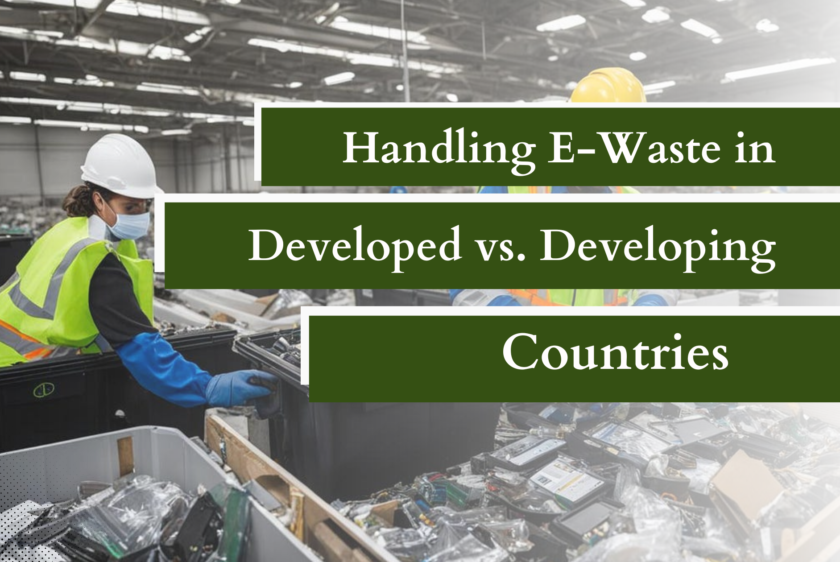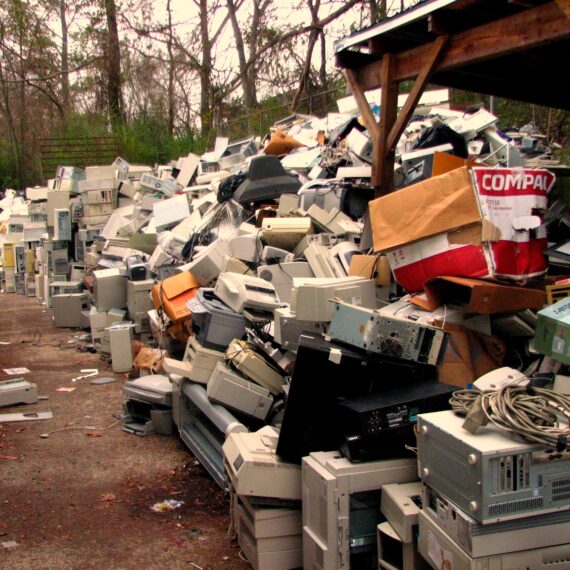
E-Waste Management in Developed vs. Developing Countries
What happens to your old smartphone or laptop when you upgrade to the latest model? Where do outdated TVs and computers end up once they’re replaced? These questions draw our attention to the often-overlooked issue of electronic waste, or e-waste. It is a growing problem in today’s technology-driven society. When we discard our old devices, they usually end up in landfills or incinerators, releasing harmful environmental toxins. As our reliance on electronic devices increases, so does the magnitude of e-waste generated worldwide. The exponential growth of e-waste poses significant challenges for both developed and developing nations. In this blog, we’ll explore the contrasting strategies these countries employ to address this global crisis.
E-Waste Management in Developed Countries
Developed countries often have stricter regulations and more resources to manage e-waste. These nations typically generate a higher volume of e-waste per capita due to higher consumer purchasing power and quicker adoption of the latest technologies. Here are key aspects of e-waste management in developed countries:
Regulatory Frameworks: Countries such as the United States, Germany, and Japan have established comprehensive e-waste management laws that enforce the responsible disposal and recycling of electronics. Regulations may include bans on landfill disposal and mandatory recycling protocols.
Advanced Recycling Technologies: Developed countries utilize advanced recycling technologies to recover valuable materials like gold, silver, and rare earth metals. It reduces the need for raw material extraction and mitigating environmental impact.
- Cutting-edge Facilities: Developed countries use robotic sorting and processing technologies that can accurately separate materials, leading to higher recovery rates and less environmental contamination.
- Innovations in Processing: Innovations such as bio-metallurgy and hydrometallurgy are employed to recover precious metals like gold and platinum from circuit boards more effectively and environmentally friendly than traditional methods.
Consumer Awareness Programs: In developed nations, there is a significant focus on consumer education and awareness programs. These programs aim to inform the public about the importance of proper e-waste disposal and the environmental benefits of recycling electronics.
- Governments and NGOs in developed countries run extensive campaigns to educate the public about the benefits of recycling e-waste and the proper disposal channels available. These campaigns often include school programs, community workshops, and online platforms.
- Some regions offer incentives, such as discounts or rebates, to consumers who recycle their old electronics. These incentives help increase the recycling rate and encourage consumers to consider the environmental impact of their electronic waste.
E-Waste Management in Developing Countries

In contrast, developing countries face different challenges due to limited regulatory frameworks and fewer resources for e-waste management. The electronic waste scenario in these countries includes:
Informal Recycling Sector: Many developing countries have large informal sectors where e-waste recycling is done by untrained workers under unregulated conditions. This often leads to improper handling of toxic materials, posing serious health and environmental risks.
- Despite international bans, many developing countries still receive illegal shipments of e-waste. These are often mislabeled as “used goods,” complicating efforts to manage local electronic waste and flooding markets with non-functional electronics.
- Challenges in Enforcement: Weak enforcement of international and local laws allows for continued e-waste dumping, which overwhelms limited local recycling capacities and leads to environmental degradation.
Lack of Infrastructure:
Developing countries often lack the infrastructure necessary for safe and efficient e-waste recycling. Without proper facilities, electronic waste is frequently disposed of alongside regular waste, leading to toxic substances leaching into the environment. Establishing advanced recycling facilities requires significant investment, which can be a major barrier for economically constrained countries. This results in a reliance on primitive recycling methods that are not environmentally sound or safe.
Import of E-Waste
Despite international bans, many developing countries still receive illegal shipments of e-waste. These are often mislabeled as “used goods,” complicating efforts to manage local e-waste and flooding markets with non-functional electronics. Weak enforcement of international and local laws allows for continued e-waste dumping, which overwhelms limited local recycling capacities and leads to environmental degradation.
Practical Solutions To Resolve This Disparity
The disparities in e-waste management between developed and developing countries highlight the need for global cooperation. Here are a few steps that can help bridge the gap:
- Building Capacity: International partnerships can help build e-waste management capacity in developing countries. This can include technology transfers, professional training, and financial support to establish formal recycling facilities.
- Enhancing Global Regulations: Strengthening global e-waste regulations can ensure more uniform practices and prevent the transfer of e-waste from developed to developing countries under the guise of second-hand electronics.
- Promoting Sustainable Practices: Encouraging the design of more durable and repairable electronic products can reduce the volume of electronic waste generated globally. Additionally, promoting a circular economy model can help ensure that resources are reused and recycled to the maximum extent possible.
Conclusion
Managing electronic waste effectively is crucial for safeguarding the environment and human health. While developed countries have made significant progress, global strategies are critical to assist developing nations in overcoming their unique challenges. By recognizing e-waste as a shared responsibility, we can foster innovation, exchange knowledge, and implement inclusive solutions that benefit both people and the planet. Together, let’s commit to a future where e-waste is managed sustainably, ensuring a healthier environment and brighter prospects.
Read Our More Blogs:
5 Reasons to Choose Our E-Waste Recycling Services
How Does E-Waste Contribute to Global Warming?







